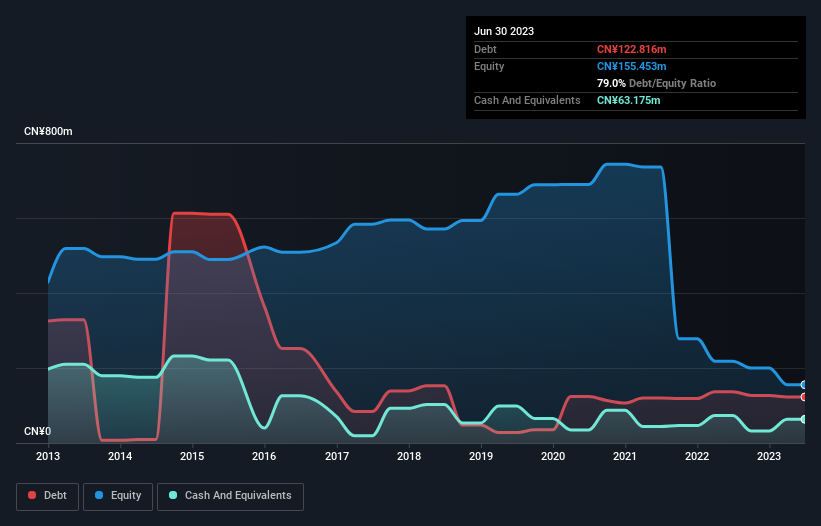The external fund manager backed by Berkshire Hathaway's Charlie Munger, Li Lu, makes no bones about it when he says 'The biggest investment risk is not the volatility of prices, but whether you will suffer a permanent loss of capital.' So it seems the smart money knows that debt - which is usually involved in bankruptcies - is a very important factor, when you assess how risky a company is. We can see that China Uptown Group Company Limited (HKG:2330) does use debt in its business. But should shareholders be worried about its use of debt?
What Risk Does Debt Bring?
Debt and other liabilities become risky for a business when it cannot easily fulfill those obligations, either with free cash flow or by raising capital at an attractive price. If things get really bad, the lenders can take control of the business. However, a more usual (but still expensive) situation is where a company must dilute shareholders at a cheap share price simply to get debt under control. Of course, debt can be an important tool in businesses, particularly capital heavy businesses. The first thing to do when considering how much debt a business uses is to look at its cash and debt together.
See our latest analysis for China Uptown Group
What Is China Uptown Group's Debt?
As you can see below, China Uptown Group had CN¥122.8m of debt at June 2023, down from CN¥136.9m a year prior. On the flip side, it has CN¥63.2m in cash leading to net debt of about CN¥59.6m.

A Look At China Uptown Group's Liabilities
The latest balance sheet data shows that China Uptown Group had liabilities of CN¥446.0m due within a year, and liabilities of CN¥5.37m falling due after that. Offsetting these obligations, it had cash of CN¥63.2m as well as receivables valued at CN¥32.6m due within 12 months. So its liabilities outweigh the sum of its cash and (near-term) receivables by CN¥355.7m.
This deficit casts a shadow over the CN¥26.2m company, like a colossus towering over mere mortals. So we'd watch its balance sheet closely, without a doubt. After all, China Uptown Group would likely require a major re-capitalisation if it had to pay its creditors today. There's no doubt that we learn most about debt from the balance sheet. But it is China Uptown Group's earnings that will influence how the balance sheet holds up in the future. So if you're keen to discover more about its earnings, it might be worth checking out this graph of its long term earnings trend.
In the last year China Uptown Group had a loss before interest and tax, and actually shrunk its revenue by 91%, to CN¥15m. To be frank that doesn't bode well.
Caveat Emptor
While China Uptown Group's falling revenue is about as heartwarming as a wet blanket, arguably its earnings before interest and tax (EBIT) loss is even less appealing. Indeed, it lost a very considerable CN¥32m at the EBIT level. Reflecting on this and the significant total liabilities, it's hard to know what to say about the stock because of our intense dis-affinity for it. Like every long-shot we're sure it has a glossy presentation outlining its blue-sky potential. But the reality is that it is low on liquid assets relative to liabilities, and it lost CN¥46m in the last year. So we think buying this stock is risky. When analysing debt levels, the balance sheet is the obvious place to start. However, not all investment risk resides within the balance sheet - far from it. We've identified 4 warning signs with China Uptown Group (at least 3 which are a bit concerning) , and understanding them should be part of your investment process.
Of course, if you're the type of investor who prefers buying stocks without the burden of debt, then don't hesitate to discover our exclusive list of net cash growth stocks, today.
New: AI Stock Screener & Alerts
Our new AI Stock Screener scans the market every day to uncover opportunities.
• Dividend Powerhouses (3%+ Yield)
• Undervalued Small Caps with Insider Buying
• High growth Tech and AI Companies
Or build your own from over 50 metrics.
Have feedback on this article? Concerned about the content? Get in touch with us directly. Alternatively, email editorial-team (at) simplywallst.com.
This article by Simply Wall St is general in nature. We provide commentary based on historical data and analyst forecasts only using an unbiased methodology and our articles are not intended to be financial advice. It does not constitute a recommendation to buy or sell any stock, and does not take account of your objectives, or your financial situation. We aim to bring you long-term focused analysis driven by fundamental data. Note that our analysis may not factor in the latest price-sensitive company announcements or qualitative material. Simply Wall St has no position in any stocks mentioned.
About SEHK:2330
China Uptown Group
An investment holding company, engages in the property investment and development business in Mainland China and Hong Kong.
Slight risk with imperfect balance sheet.
Market Insights
Community Narratives




